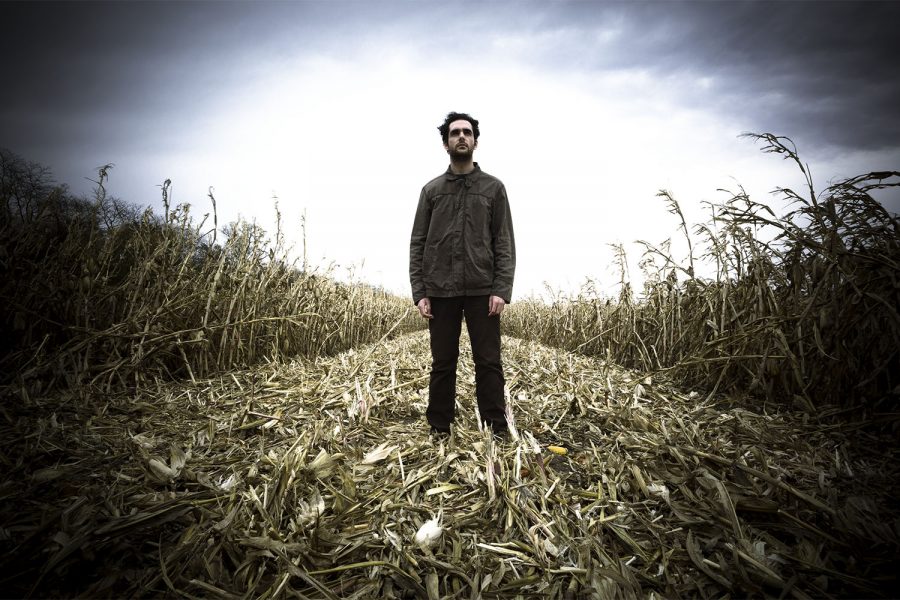‘An Unsettled Body,’ to explore historical moment through new lens
University of Iowa MFA students Jeremy Geragotelis and Kenneth Collins recount and reshape the history of a Quaker woman, Lydia, who in 1661, walked naked into her church in Massachusetts as a form of protest.
Photo of Jeremy Geragotelis, writer and performer, from An Unsettled Body. Contributed by director Kenneth Collins.
February 18, 2021
On a Sunday morning in 1661, in the small town of Newbury, Massachusetts, a young Quaker woman named Lydia walked naked into her church.
In 17th century New England, Puritans exerted extreme power over other faith practices, specifically Quakers, in the form of dangerous laws and harsh punishments. Local parish services were required of all Newbury citizens, and people who did not attend would be stripped, whipped, or fined. In a call for religious liberty, Lydia presented her naked body as a protest.
For Jeremy Geragotelis, MFA playwright at the University of Iowa, reflecting on this historical event raised many questions and resonated with some of his more contemporary questions about gender and the body. His upcoming multimedia performance of, “An Unsettled Body,” is an attempt to explore some of these questions.
According to Geragotelis, there is a great deal of crucial information about Lydia that is lost because of the lack of photography and videography documentation available in that time period. Things such as her spirituality, her personhood, and her values were unable to be communicated through any medium other than text, he said. Even her last name can be found with various spellings on different internet sources.
“Having that sort of gap is an interesting problem as a theater maker and as just a thinker, trying to guess at what that embodied experience would actually be like, what does it mean for somebody to perform the specific act,” Geragotelis said. “What does it mean for the audience that’s sitting there to witness that act? Those are all question marks that I think the project is trying to sort of get at and grapple with.”
The work, directed by MFA theatre arts student Kenneth Collins, combines three separate parts; a film (“What They See”), an audio experience (“What They Hear”), and an interactive website that features photos, text, and videos (“What They Do”). Each piece serves to build a new way pathway for the audience to engage with this historical event.
RELATED: Generation Candyland: UI Theatre Department’s next play tackles some not-so-sweet subject matter
“They’re all dealing with the same subject matter, they’re doing this, this historical event, and we were really interested in building certain poetic resonances between the different things” Geragotelis said. “So, you’ll see certain images, certain ideas, certain pieces of language happen on each surface, and act as a way in which these things sort of thread together and become one.”
Although originally intended to be a play, the work evolved into a three-part dramaturgy when Geragotelis and Collins started discussing other avenues they could take among the emergence of the COVID-19 pandemic.
UI stage manager and sound designer Taylor Jackson said seeing these new ideas come to life felt exciting.
“As grad students, we are expected to explore and try new things, but being grad students while also navigating a pandemic calls for extra innovation and creativity,” Jackson said. “I’m thrilled to be working with artists that recognize and respect that balance and want to push boundaries and question, ‘What is a play?’ and ‘How do we as artists and audience members come to realize and engage with it?’”
Collins said as these opportunities arise to expand and diversify the forms theater, they could be able to invite different voices that might not otherwise be engaged.
“Not everyone’s going to necessarily be interested in staging a play on a stage or going to see a work like that,” Collins said. “And I think that in a time where we’re looking at how to expand and diversify our audiences and our artists and whose stories get told and what kind of stories get told, that the more we’re able to loosen our are definitions of the shape and form that theater is allowed to take; the more we’re able to actually do that mission any kind of justice.”
“An Unsettled Body” will be available on the Theatre Department’s YouTube channel from Feb. 20 to Feb. 26. Additional information about viewing the production is available on the department’s website. Geragotelis said he hopes for people to watch with an open heart and a sense of curiosity.
“Our experience – hopefully, if it’s working correctly – our experience is disrupted and disjunctive and disconnected in ways that feel important,” Geragotelis said. “I hope people sort of approach that with a sense of curiosity and interest and eagerness to sort of, to maybe not always know what’s happening or how things are accumulating; trusting that it will, that everything that you see and interact with and make meaning out of does end up mattering by the time you finish the experience.”



